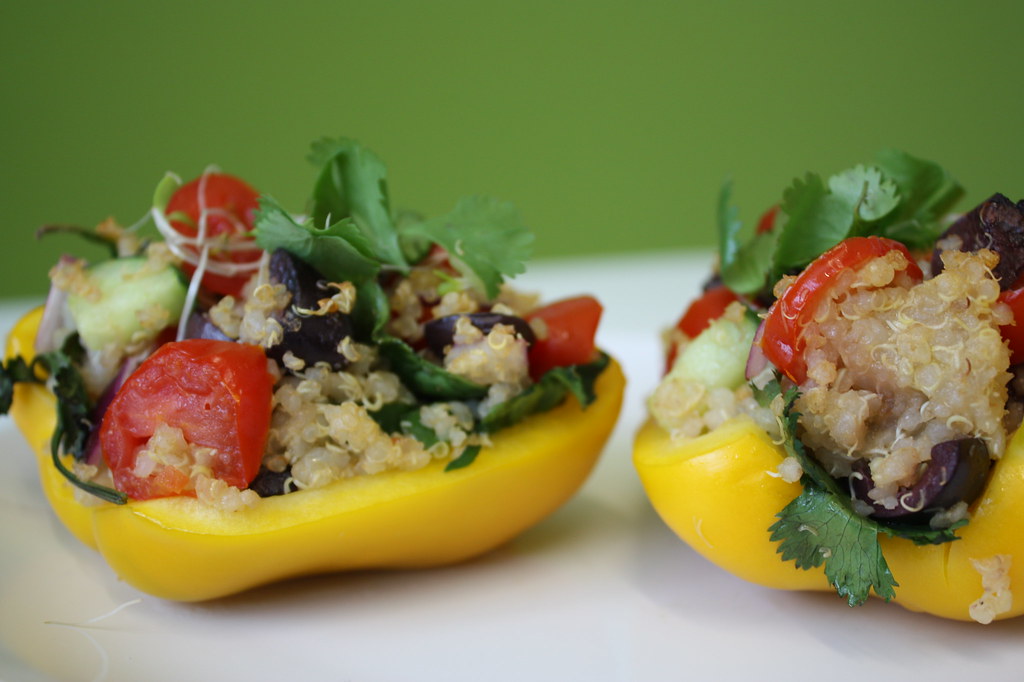Nutrition
5 AMAZING Dinner Recipes That Are Also HEALTHY

Eating healthy doesn’t mean you have to compromise on taste or satisfaction. Here are five amazing dinner recipes that not only tantalize your taste buds but also contribute to your health goals.
1. Quinoa-Stuffed Bell Peppers
A protein-packed meal that is full of flavor, this recipe combines the nutty taste of quinoa with fresh bell peppers and a sprinkle of cheese.
Ingredients: 4 bell peppers (any color), 1 cup quinoa, 2 cups vegetable broth, 1 can black beans (drained and rinsed), 1 cup corn, 1 cup shredded cheese, 1/2 cup diced onions, 2 cloves garlic (minced), olive oil, salt, and pepper.
Instructions: Preheat the oven to 375°F (190°C). Cut off the tops of the bell peppers, remove seeds and membranes, then set aside. Cook quinoa in vegetable broth as per package instructions. Sauté onions and garlic in olive oil until translucent. Combine the cooked quinoa, sautéed onions and garlic, black beans, corn, half of the cheese, and season with salt and pepper. Stuff the bell peppers with the mixture, top with remaining cheese, and bake for 30 minutes.
2. Grilled Salmon with Avocado Salsa
This heart-healthy recipe combines omega-3 rich salmon with creamy avocado salsa.
Ingredients: 4 salmon fillets, 2 avocados (diced), 1/2 red onion (diced), juice of 2 limes, 1 tablespoon olive oil, 2 tablespoons chopped cilantro, salt, and pepper.
Instructions: Season salmon with salt, pepper, and a drizzle of olive oil. Grill each side for 5-6 minutes. Mix diced avocados, red onion, lime juice, cilantro, and season with salt and pepper. Top the grilled salmon with avocado salsa and serve.
3. Greek-Style Zucchini Noodles
A low-carb alternative to pasta, these zucchini noodles are light and packed with Mediterranean flavors.
Ingredients: 4 zucchinis, 1 cup cherry tomatoes (halved), 1/2 cup feta cheese, 1/2 cup pitted kalamata olives, 2 tablespoons olive oil, juice of 1 lemon, 2 cloves garlic (minced), salt, and pepper.
Instructions: Spiralize the zucchinis into noodles. Sauté garlic in olive oil until fragrant, add zucchini noodles, and cook for 2-3 minutes. Turn off the heat and add cherry tomatoes, feta cheese, olives, and lemon juice. Season with salt and pepper, toss together, and serve.
4. Cauliflower Fried Rice
A low-carb version of the classic dish, this cauliflower rice recipe is flavorful and satisfying.
Ingredients: 1 head cauliflower, 2 tablespoons sesame oil, 1/2 cup diced onions, 1/2 cup peas, 1/2 cup carrots (diced), 2 eggs, 2 tablespoons soy sauce, 2 green onions (chopped).
Instructions: Process cauliflower in a food processor until it resembles rice. Heat sesame oil in a large pan, sauté onions, peas, and carrots until soft. Push vegetables to the side, crack eggs into the pan, scramble and mix with the veggies. Add cauliflower rice and soy sauce, stir well, and cook for another 5-7 minutes. Garnish with green onions and serve.
5. Baked Chicken with Sweet Potatoes and Brussels Sprouts
This one-pan recipe is high in protein and packed with nutrients.
Ingredients: 4 chicken breasts, 2 sweet potatoes (cubed), 2 cups Brussels sprouts (halved), 2 tablespoons olive oil, 1 teaspoon rosemary, 1 teaspoon thyme, salt, and pepper.
Instructions: Preheat oven to 400°F (200°C). Place chicken, sweet potatoes, and Brussels sprouts on a baking sheet. Drizzle with olive oil, season with rosemary, thyme, salt, and pepper, and toss to coat. Bake for 25-30 minutes until chicken is cooked through and vegetables are tender.
Each of these meals offers a balance of protein, fiber, and healthy fats to keep you satisfied and energized. They’re proof that healthy eating can be delicious and satisfying. Enjoy!
